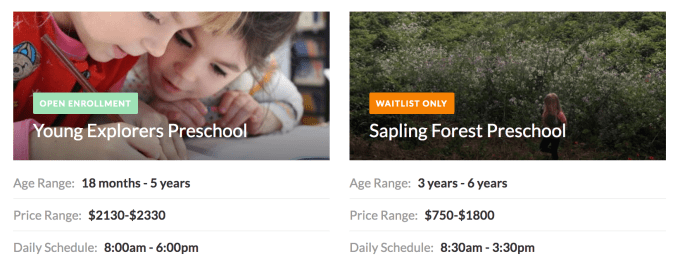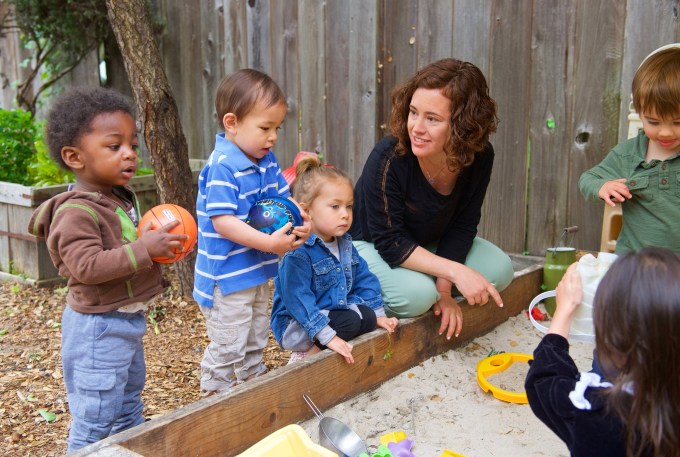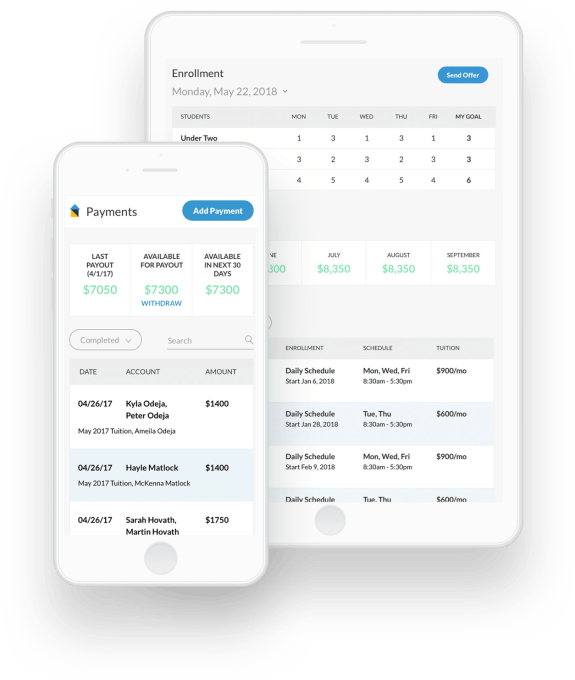Educators already don’t get paid enough, and those that work in preschools or daycares often make 48% less. Meanwhile, parents struggle to find great early education programs where kids receive enough attention and there’s space, but they don’t need special connections or to pass grueling admissions interviews to get in.
Any time there’s a lousy experience people have an emotional connection to and spend a lot of money on, there’s an opportunity for a startup. Enter ‘Wonderschool‘, a company that lets licensed educators and caretakers launch in-home preschools or daycares. Wonderschool helps candidates get credentialed, set up their programs, launch their websites, boost enrollment, and take payments in exchange for a 10 percent cut of tuition. The startup is now helping run 140 schools in the SF Bay, LA, and NYC where parents are happy to pay to give their kids an advantage.
That chance to fill a lucrative gap in the education market has attracted a new $20 million Series A for Wonderschool led by Andreessen Horowitz. The round brings the startup to $24.1 million in total funding just two years after launch. With the cash and Andreessen partner Jeff Jordan joining its board, Wonderschool is looking to build powerful lead generation and management software to turn teachers into savvy entrepreneurs.

“Finding good childcare has become one of the most difficult experiences for families. I’ve seen parents who are making a livable wage in urban cities like San Francisco and New York still struggle to find and afford quality childcare” says co-founder and CEO Chris Bennett. “We wanted to deliver a solution for parents that also had the potential to create jobs and empower the caregiver — that’s Wonderschool.”
By spawning and uniting programs across the country, Wonderschool could scale as the way software eats preschool. But without vigorous oversight of each educator, Wonderschool is also at risk of a safety mishap at one of its franchises ruining the brand for them all.
Airbnb For Schooling
Wonderschool started when co-founder Arrel Gray was having trouble finding childcare for his daughter close to home. “My little sister went to an in-home preschool, so I suggested he check them out” says Bennett. “But he wasn’t very satisfied with the options – the majority were full and some didn’t meet the expectations for his family. We also found that they didn’t use the internet much so they were hard to find and contact.”
The two were seeking to pivot their social commerce startup Soldsie after Facebook algorithm changes curtailed its growth. Their research led to the discovery of just how much lower preschool and daycare workers’ wages were. “When we had the idea we thought, ‘what the best way to test this?’ Why don’t we start a preschool ourselves’” says Bennett. “So we rented a home in the Berkeley Hills, hired an amazing educator, set up a school and started one. The school ended up being a huge success. Five-star reviews on Yelp. A high NPS. Parents loved the place.” It also netted the teacher a 3X higher salary than before.

With that proof, Wonderschool went on to raise $4.1 million from Josh Kopelman at First Round Capital, Omidyar Network, Cross Culture Ventures, Uncork Capital, Lerer Hippeau, FundersClub, and Edelweiss. That let Bennett and Gray flesh out the business. Wonderschool would recruit existing teachers and caregivers or guide people to get licensed so they could become “directors” of in-home schools. Wonderschool acts almost like Airbnb by turning them into small businesses earning money from home.
Teachers can pick whatever schedule, curriculum, or format they want, like Montesori or nature-focused learning. Wonderschool now has over 500 directors working with its software, with some making as much as $150,000 or $200,000. In exchange for its 10 percent cut of tuition, Wonderschool provides directors with a “bootcamp” to prep them for the job. It pairs them with a mentor, then helps them build their website and figure out their pricing options. Coaching guides train the directors to scout for new leads, offer appealing tours, and track their fledgling business.

The $20 million from Andreessen, Omidyar, Gary Community Investments, and First Round will go to expanding the Wonderschool software. Each student slot it can help director fill, the more it earns. The startup will also have to compete with companies like Wildflower Schools, which Bennett admits has a similar business model but he says “We are focused on in home and they also focus on Montessori while we are curriculum agnostic.” There’s also Cottage Class which powers homeschooling for students up to age 18, Tinkergarten that concentrates on short-term outdoor education, and VIPKid connects kids in China with U.S. teachers over video chat.
They, like Wonderschool, are trying to scale up to meet the massive existing demand. “The challenge is that there aren’t enough programs for the number of children needing public or private schooling – 1st grade or earlier – and our goal is to provide enough supply for every child” Bennett explains.

Still, safety remains a top concern. Bennett notes that “Wonderschool has a support team that helps school Directors prepare their homes for operation. With regard to safety, each state’s licensing office covers this in their approval process for being granted a license to operate.” But could a problem at one school shake the businesses of all the rest of its franchises? “We have a system of checks in balances in place that we feel confident would allow us to anticipate any potential issues, including regular, weekly check-ins with Directors and a feedback loop with parents. We also email parents on a regular cadence to get feedback from parents and we step in and work with the Director if we find that there are issues” Bennett insists.
If Wonderschool can keep its brand clean through thorough oversight, it could both create better paying jobs in a field rife with undercompensated heroes, and open early schooling to a wider range of students. Bennett’s parents moved to the U.S. from Honduras, pouring their efforts into supporting his and his sister’s education. Now he’s building the next generation of teachers the tools to give more kids a head start in life.






